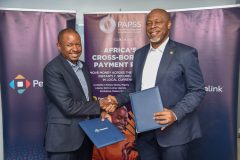Anwar’s tenure lasted under two years. Safaricom Ethiopia has also not revealed who will take over his position.
Safaricom Ethiopia’s CEO, Anwar Soussa, is leaving the company. Anwar joined Safaricom in August 2021, and his exit from the company will take effect at the end of July, ending a 2-year run. In a statement shared by Safaricom, the operator said, “Anwar Soussa, chief executive officer of Safaricom Ethiopia, will be leaving the business effective 31st July 2023 once his secondment comes to an end. Under Anwar’s leadership, the telco also secured a mobile financial services licence, paving the way for the launch of M-PESA services. Our heartfelt gratitude to Anwar for his leadership and contributions to Safaricom Ethiopia. Throughout his tenure, he has demonstrated unwavering passion and commitment, which have played a crucial role in our achievements thus far. We will announce Anwar’s successor in due course.”
Safaricom Ethiopia’s parent company, Safaricom (Kenya), launched a bid to enter Ethiopia as early as 2020. Ethiopian authorities accepted the offer in 2021, when Safaricom launched pilot telco programs alongside its partners, Vodacom Group, Sumitomo Corporation, and CDC Group, collectively called Global Partnership for Ethiopia (GPE). The launch cost the consortium $850 million.
Over the following months, Safaricom Ethiopia got its house in order by hiring employees, setting up network infrastructure such as data centres, and slowly onboarding customers. The official commercial launch occurred in October 2022. The company has since streamlined customer onboarding with digital biometrics and e-KYC processes at over 5,000 locations. It serves locals with up to five languages. It has also focused on being a youthful brand offering internet services, voice, SMS, and home 4G Wi-Fi.
In the 2022/2023 FY results, Safaricom Ethiopia had a customer base of over 4 million, with approximately 2.1 million actively using their services while aiming to reach 10 million customers by 2024. The revenue generated by these customers amounted to KES 562.4 million (over $4 million), with mobile data contributing 63%, voice services accounting for 24%, and the remainder coming from messaging and mobile services.
Safaricom has yet to reveal who will take over the role.




















